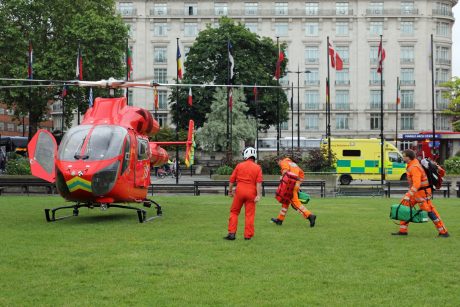London Ambulance Service and London’s Air Ambulance pioneer treatment for cardiac arrest patients
For the first time in the UK, paramedics at London Ambulance Service are part of a team bringing a pioneering life-saving treatment to the streets of the capital.

The Service has worked alongside London’s Air Ambulance and Barts Health NHS Trust to launch a ground-breaking new team known as the Endovascular Cardiac Arrest Team.
London Ambulance Service responds to around 12,000 patients a year in cardiac arrest – at the moment fewer than 10 per cent survive.
The new team can now deliver an intervention which can give some of these patients a better chance.
The treatment is called extracorporeal membrane oxygenation (ECMO) and it involves using a machine to temporarily take over the heart and lung function in patients who are not responding to standard resuscitation.
It is a highly specialised technique that involves pumping blood outside the body through an artificial lung to add oxygen and take away carbon dioxide before pumping the blood back into the body.
This is a similar procedure used for someone having open heart surgery when a machine takes over the function of the heart and lungs.
Consultant paramedic Mark Faulkner said: “When someone is in cardiac arrest the best way to save a life is for those close by the patient to help.
“Anyone can do this in the minutes before an ambulance arrives. Learning simple life-saving skills like how to perform chest compressions or use a defibrillator can mean the difference between life and death.
“For some patients who do not respond to these interventions, ECMO at the scene can give them another chance – one that until now has only been available in a small number of hospitals.”
The specialist team will be dispatched in a helicopter or rapid response car by a paramedic in the London Ambulance Service 999 emergency operations centre.
London Ambulance Service has previously pioneered direct transport from scene to ECMO centres.
Senior paramedics from the Service have since worked with London’s Air Ambulance to work out how to bring ECMO to the patient.
No other ambulance service or air ambulance service in the UK has been able to offer this until now.
Similar schemes abroad have shown improved outcomes, including brain function, for patients when ECMO is started within 60 minutes of arrest.
Dr Fenella Wrigley, Chief Medical Officer at London Ambulance Service, said: “Nothing like this has been delivered in the UK before and it is very exciting to work alongside our partners to improve outcomes for patients.
“When someone is in cardiac arrest, timing is everything. That is from giving immediate bystander chest compressions and a shock from a defibrillator to very advanced treatments like ECMO.
“The sooner ECMO can be started, a patient’s chance of survival rate is improved and the risk of a brain injury is reduced.”
Dr Ben Singer, of London’s Air Ambulance, has developed and led the project.
He said: “Providing artificial heart support during cardiac arrest can make all the difference to patient outcomes.
“This project can help level the playing field, offering a vital bridge for patients who do not respond to conventional resuscitation, giving them the best chance to reach specialist centres and get the care they need.”

Follow us on social media: